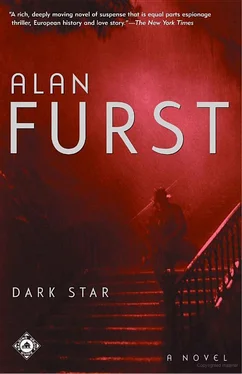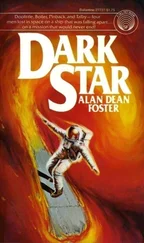Alan Furst - Dark Star
Здесь есть возможность читать онлайн «Alan Furst - Dark Star» весь текст электронной книги совершенно бесплатно (целиком полную версию без сокращений). В некоторых случаях можно слушать аудио, скачать через торрент в формате fb2 и присутствует краткое содержание. Жанр: Шпионский детектив, на английском языке. Описание произведения, (предисловие) а так же отзывы посетителей доступны на портале библиотеки ЛибКат.
- Название:Dark Star
- Автор:
- Жанр:
- Год:неизвестен
- ISBN:нет данных
- Рейтинг книги:3 / 5. Голосов: 1
-
Избранное:Добавить в избранное
- Отзывы:
-
Ваша оценка:
- 60
- 1
- 2
- 3
- 4
- 5
Dark Star: краткое содержание, описание и аннотация
Предлагаем к чтению аннотацию, описание, краткое содержание или предисловие (зависит от того, что написал сам автор книги «Dark Star»). Если вы не нашли необходимую информацию о книге — напишите в комментариях, мы постараемся отыскать её.
Dark Star — читать онлайн бесплатно полную книгу (весь текст) целиком
Ниже представлен текст книги, разбитый по страницам. Система сохранения места последней прочитанной страницы, позволяет с удобством читать онлайн бесплатно книгу «Dark Star», без необходимости каждый раз заново искать на чём Вы остановились. Поставьте закладку, и сможете в любой момент перейти на страницу, на которой закончили чтение.
Интервал:
Закладка:
CANNOT ACCEPT SILENCE/PRAGUE IN PRESENT FORM STOP BY 25 NOVEMBER DEVELOP INFORMATION FOR PROFILE OF DR JULIUS BAUMANN, SALZBRUNNER 8, BERLIN, SUCCESSFUL INDUSTRIALIST STOP SUBMIT ALL MATERIAL DIRECTLY TO SOVPRESS SUPERVISOR BERLIN STOP SIGNED NEZHENKO.
He saw that the clerk was waiting for him to explode but he shut his emotions down at once. He was, he told himself, a big boy, and shifts of party line were nothing new. His success as a correspondent, and the considerable freedom he enjoyed, were based equally on ability and a sensitivity to what could and could not be written at any given moment. He was annoyed with himself for getting it wrong, but something was brewing in Moscow, and it was not the moment for indignation, it was the moment for understanding that political developments excluded stories on Prague. For the clerk’s benefit, he nodded in acceptance: Soviet journalism worker accepts criticism and forges ahead to build socialism. Yes, there was an overflowing wastebasket at his feet, and yes, he yearned to give it a mighty kick that would send it skittering into the wall, but no, he could not do it. “Then it’s to be Berlin,” he said calmly. He folded the telegram and slid it into the pocket of his jacket, said good-bye to the clerk, smiled brightly, and left, closing the door behind him so softly it made not a sound.
That night he was early for the Berlin express and decided to have a sandwich and coffee at the railway station buffet. He noticed a group of men gathered around a radio in one corner of the room and wandered over to see what was so interesting. It was, as he’d supposed, a political speech, but not in Czech, in German. Szara recognized the voice immediately-Adolf Hitler was born to speak on the radio. He was a brilliant orator to begin with, and somehow the dynamics of wireless transmission-static, the light hiss of silence-added power to his voice. Hitler teased his audience, tiptoeing up to a dramatic point, then hammering it home. The audience, tens of thousands by the sound of it, cheered itself hoarse, swept by political ecstasy, ready to die then and there for German honor.
Szara stood at the outer fringe of the group and listened without expression or reaction, pointedly ignoring an unpleasant glance of warning from one of the Czechs-Slovakians? Sudeten Germans? — gathered around the radio. The voice, working toward a conclusion, was level and sensible to begin with:
Then the final aim of our whole party is quite clear for all of us. Always I am concerned only that I do not take any step from which I will have to retreat, and not to take any step that will harm us.
I tell you that I always go to the outermost limits of risk, but never beyond. For this you need to have a nose [laughter; Szara could imagine the gesture], a nose to smell out, more or less, “What can I still do?” Also, in a struggle against an enemy, I do not summon an enemy backed by a fighting force, I do not say “Fight!” because I want to fight. Instead I say “I will destroy you” [a swell of voices here, but Hitler spoke through it]. And now, Wisdom, help me. Help me to maneuver you into a corner where you cannot fight back. And then you get the blow, right in the heart. That’s it!
The crowd roared in triumph and Szara felt his blood chill. As he turned to walk away there was a blur of motion to his right, the side of his head exploded, then he found himself sprawled on the filthy tiles of the restaurant floor. Looking up, he saw a man with a twisted mouth, his upper body coiled like a spring, his right fist drawn back over his left shoulder in order to hit a second time. The man spoke German. “Jew shit,” he said.
Szara started to get up, but the man took a step toward him so he stayed where he was, on hands and knees. He looked around the restaurant; people were eating soup, blowing on their spoons before sipping it up. On the radio, a commentator’s voice sounded measured and serious. The other men around the radio did not look at him, only the man with his fist drawn back-young, ordinary, broad, in a cheap suit and a loud tie. Szara’s position seemed to mollify the man, who pulled a chair toward him and sat back down with his friends. He placed a metal salt shaker next to the pepper.
Slowly, Szara climbed to his feet. His ear was on fire, it throbbed and buzzed and he could hear nothing on that side. His vision was a little fuzzy and he blinked to clear it. As he walked away he realized that there were tears in his eyes- physical, physical, he told himself-but he was in many kinds of pain and he couldn’t sort it out at all.
The Prague-Berlin night express left the central station at 9:03 P.M., due in at Berlin’s Bahnhof am Zoo station at 11:51, stopping only at the Aussig border control post on the east bank of the Elba. Szara now traveled with two bags, his own and the leather satchel. The train was cold and crowded and smoky. Szara shared a compartment with two middle-age women he took to be sisters and two teenage boys whose windburned faces and khaki shorts suggested they’d been on a weekend mountain-climbing holiday in Czechoslovakia and had stayed on until Tuesday before returning to school in Germany.
Szara had some anxiety about the German customs inspection, but the officer’s revolver now lay at the bottom of the Vltava and he doubted that a file written in Russian-something it would be normal for him to have-would cause any difficulty. Border inspections concentrated on guns, explosives, large amounts of currency, and seditious literature-the revolutionary toolkit. Beyond that, the inspectors were not very interested. He was taking, perhaps, a small chance, that a Gestapo officer would be in attendance (not unlikely) and that he would know enough Russian to recognize what he was looking at (very unlikely). In fact, Szara realized he didn’t have much of a choice: the file was “his,” but not his to dispose of. Sooner or later, they would want to know what had become of it.
As the train wound through the pine forests of northern Czechoslovakia, Szara’s hand rose continually to his ear, slightly red and swollen and warm to the touch. He’d been hit, apparently, with the end of a metal salt shaker enclosed in a fist. As for other damage- heart, spirit, dignity; it had a lot of names-he finally managed to stand off from it and bring himself under control. No, he told himself again and again, you shouldn’t have fought back. The men listening to the radio would’ve done far worse.
The border control at Aussig was uneventful. The train slowly gained speed, ran briefly beside the Elba, shallow and still in the late autumn, and soon after passed the brown brick porcelain factories of Dresden, red shadows from the heating kilns flickering on the train windows. The track descended gradually from the high plain of Czechoslovakia to sea-level Germany, to flat fields and small, orderly towns, a stationmaster with a lantern standing on the platform at every village.
The train slowed to a crawl-Szara glanced at his watch, it was a few minutes after ten-then stopped with a loud hiss of decompression. The passengers in his compartment stirred about irritably, said “Wuss?” and peered out the windows, but there was nothing to see, only farm fields edged by woodland. Presently, a conductor appeared at the door to the compartment. An old gentleman with a hat a size too large for him, he licked his lips nervously and said, “Herr Szara?” His eye roamed among the passengers, but there was really only one possible candidate.
“Well?” Szara said. Now what?
“Would you be so kind as to accompany me, it’s just …”
Entirely without menace. Szara considered outrage, then sensed the weight of Teutonic railroad bureaucracy standing behind this request, sighed with irritation, and stood up.
Читать дальшеИнтервал:
Закладка:
Похожие книги на «Dark Star»
Представляем Вашему вниманию похожие книги на «Dark Star» списком для выбора. Мы отобрали схожую по названию и смыслу литературу в надежде предоставить читателям больше вариантов отыскать новые, интересные, ещё непрочитанные произведения.
Обсуждение, отзывы о книге «Dark Star» и просто собственные мнения читателей. Оставьте ваши комментарии, напишите, что Вы думаете о произведении, его смысле или главных героях. Укажите что конкретно понравилось, а что нет, и почему Вы так считаете.












